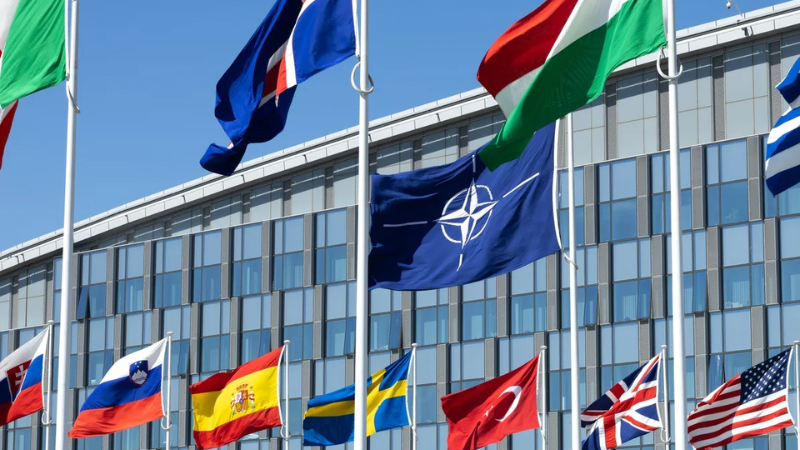
US Defense Is Collateral Damage in the Trade War
By Retired Admiral James Stavridis, Fletcher Dean Emeritus, and former supreme allied commander of NATO
Just watch as America’s best partners look to cut deals with China.
President Trump Donald Trump believes his “Liberation Day” tariffs will generate billions of dollars in revenue for the US, level a playing field he believes is slanted against American exports, and usher in a golden age of US economic dominance. Although most economists, not to mention markets, seem to have little faith in such predictions.
But there is another set of challenges for the US as it fitfully pursues a trade war and an increasingly isolationist approach: national security concerns, which thus far have not been a significant part of the debate. If Washington carries out harsh trade penalties against allies, partners and friends, how will that harm America’s global influence? How might this aid its primary rival, China?
The first danger is the most obvious. If the US economy weakened through a combination of inflation, costly subsidies and a recession, there will be diminishing resources available for the Pentagon. Already, Defense Secretary Pete Hegseth is looking for big cuts in legacy systems (ground troops, mechanized equipment, older fighter jets) in order to spend more on cutting-edge unmanned vehicles, space systems, cybersecurity, artificial intelligence, hypersonic missiles, lasers, the “Golden Dome” domestic missile-defense system, and a new generation of manned fighter aircraft. Shifting the dial in some ways makes sense. But if the US economy is damaged, modernization will likely be scaled back.
A second concern is the impact on US alliances and partnerships. In the initial tranche of 90-plus tariffs, notably absent were new penalties on Russia, Belarus and North Korea. (The Trump administration’s shifting rationale for this is questionable at best.) Meanwhile, many of America’s closest allies received significant levies in the Liberation Day plan: all European Union nations (20%), Japan (24%), Switzerland (31%), Israel (17%), South Korea (25%), Taiwan (32%), Thailand (36%). Some of the levies have been waived for 90 days, but nobody knows what the mercurial Trump will do next, a security threat in itself.
While it is conceivable that some of these friends will be able to separate trade disagreements from alliances and partnerships, there is already a corrosive effect at work. I know Ursula von der Leyen, the president of the European Commission, well from her time as Germany’s defense minister while I was supreme allied commander of the North Atlantic Treaty Organization. She has enormous will and integrity, and while she is leaving the door open for negotiation, believe her when she says, “we are also prepared to respond through countermeasures and defend our interests.” The first of these came Wednesday, when European nations approved reciprocal tariffs on some agricultural and metal imports.
Geopolitically, if the US finds itself in a significant trade war with the EU, it can expect less cooperation on the biggest security topics: facing China in the South China Sea; forcing Russian President Vladimir Putin to negotiate on Ukraine; managing challenges from Russia in the Arctic; containing Iran’s nuclear program; striking the Houthis in Yemen. The EU collectively has the second-largest defense budget in the world. Weakening the transatlantic alliance will weaken our security significantly.
A third national concern is the effect on two areas where the US has a huge lead on the rest of the world: technology and defense exports. Other nations are threatening to levy large penalties on US services overseas, which now generally operate free of tariffs. This could hurt US high-tech firms, which are increasingly vital to producing advanced weapons. The Europeans may decide they want to protect their own capable defense companies, and wean themselves off buying from US contractors. They currently buy 75% of their military equipment from the US defense industrial base.
Fourth, a timeless danger may emerge as well: smuggling. Whenever consumers want goods at lower prices to avoid taxes or tariffs, illicit traffic follows. Small products like microchips, iPhones or medicines would not be hard to sneak across already porous borders. Just as with drug smuggling, this may lead to criminality, corruption and chaos on US borders.
Finally, China is likely to be the ultimate geopolitical benefactor of a sudden, massive increase in US tariffs. Yes, Trump has hit Chinese imports with a tariff of over 100%, but this is likely to backfire like it did during Trump’s first term. Simply put, US consumers want Chinese goods more than China needs American imports.
Meanwhile, Beijing may make new friends. Its Belt and Road Initiative already involves 150 countries, providing economic incentives, direct investment and foreign aid. Coupled with the Trump administration’s decision to slash such aid and gut the US Agency for International Development, America is scoring a geopolitical own goal. A week ago, I saw something I couldn’t have imagined: the trade ministers of South Korea, Japan and China standing shoulder-to-shoulder and indicating they could coordinate their responses to the Trump tariffs.
Many smaller nations will now see a better offer available from Beijing, and it is hardly inconceivable that the European allies, Canada and Mexico will carve out trade arrangements with China. This will further weaken NATO, which has been creaking badly since the arrival of Team Trump. As the leaked “Signalgate” conversations showed, some of the most senior members of the administration hold the Europeans in contempt.
It is possible that much of the economic damage of the tariffs can be rectified through negotiation and diplomacy. Perhaps America’s military partners may be able to compartmentalize the damage to economic relations and continue to be robust national-security allies. But geopolitics and international relations so often turn on a combination of economic impact, personal animus and raw nationalism. That’s a lesson the Trump administration may learn, to the detriment of all our security.
(This post is republished from Bloomberg.)
